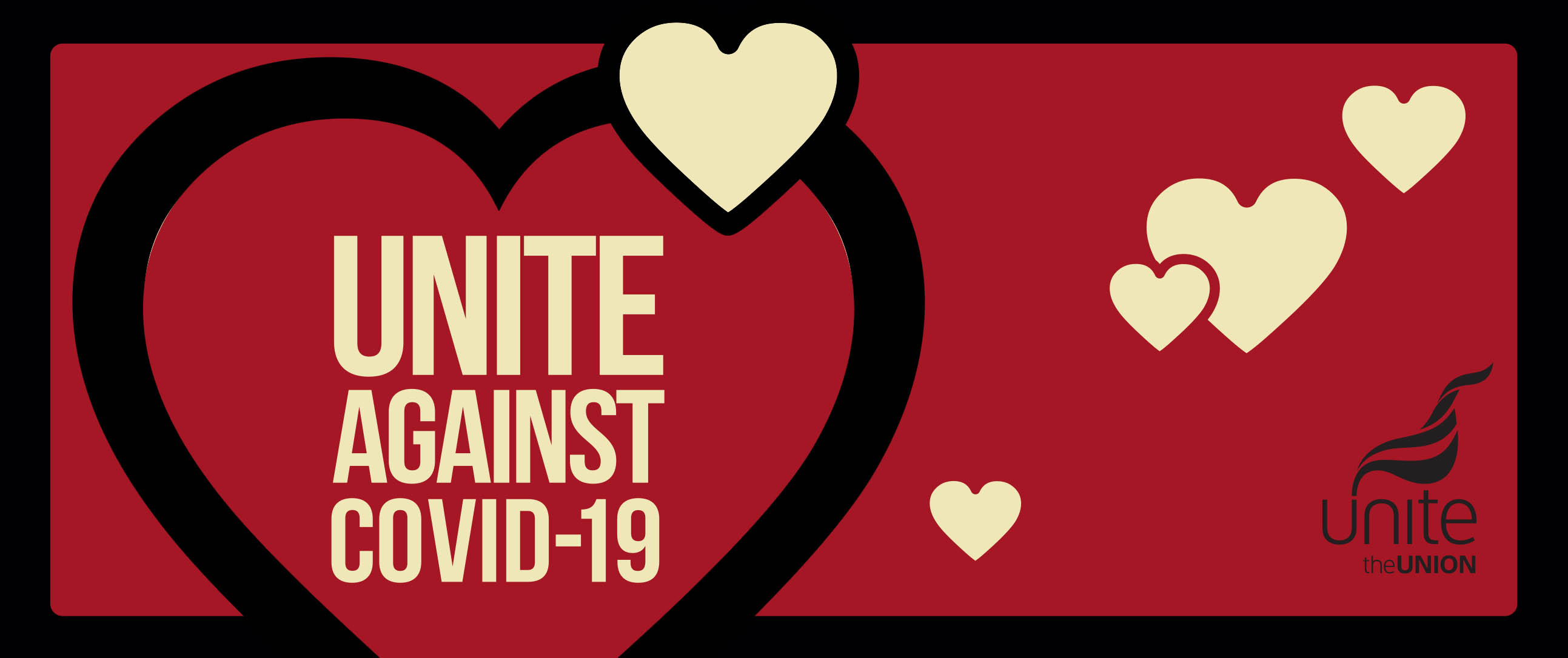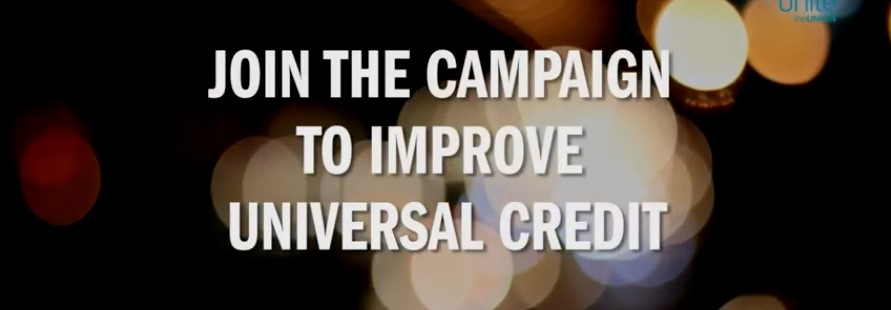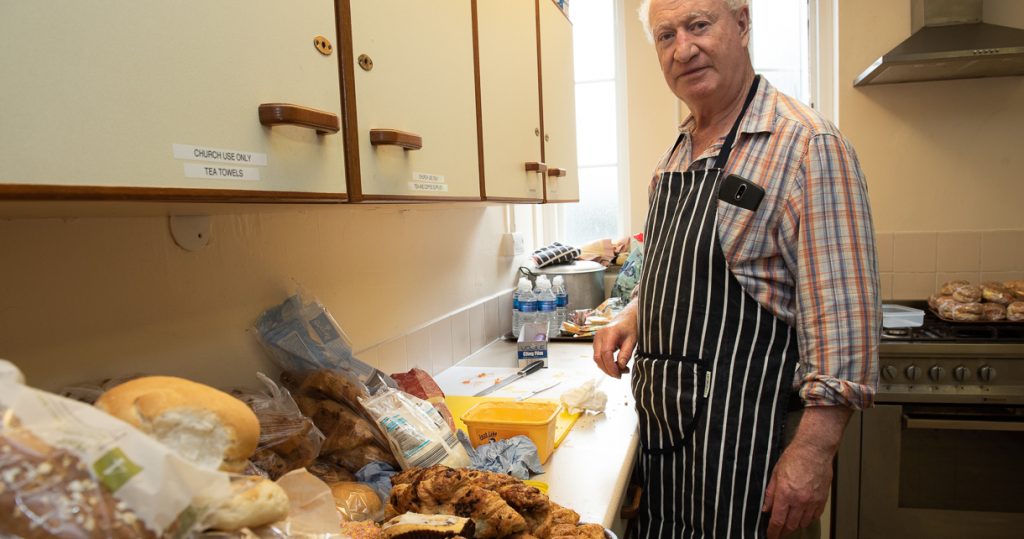‘We must help each other’
Unable to work, Karen’s only lifeline has been Employment Support Allowance (ESA), the disability and illness benefit which allowed her to get by. But her life suddenly turned upside down when her ESA was stopped.
It wasn’t a simple mistake that could be fixed in a day or two – the benefits which she was entitled to were withheld for five entire months.
“I spent two and half of those months with absolutely nothing because I didn’t know where to go,” she told UNITElive.
During this time, Karen severely deteriorated – her weight dropped by three stone.
She eventually found out about a local Trussell Trust food bank. It wasn’t until she walked through the door that it had dawned on her the desperate situation she was in.
“I completely broke down crying,” she said.
Karen is one of the millions each year who fall through the system’s cracks and turn to foodbanks for help out of desperation – in December 2015 alone, the Trussell Trust food bank network provided 133,734 three day emergency food supplies to people in crisis; 56,779 of these went to children.
“If it weren’t for foodbanks, I wouldn’t be here today and that’s a fact,” Karen said.
Austerity to blame
Karen isn’t alone — foodbanks save countless lives in a country blighted by government austerity.
And that’s why Unite is teaming up with the Mirror’s Real Britain and the Trussell Trust in our Hope Not Hunger Christmas appeal in support of foodbanks, which has in only days already raised thousands of pounds from Unite members across the country.
The campaign was today (December 7) given a boost by dozens of Labour MPs, including Labour leader Jeremy Corbyn (pictured) and shadow chancellor John McDonnell, outside Parliament at a â€pop-up’ food bank. The MPs gathered alongside foodbank users, Unite community members and those working and volunteering for the Trussell Trust.
Labour MP for Gateshead Ian Mearns told UNITElive that foodbanks need the public’s support.
“It’s a great sadness to me that foodbanks have to be used in this day and age,” he said. “While we really wish we didn’t need them, the fact that we actually do need them means we have to support them – it’s as simple as that.”
Mearns laid the blame of growing hunger in the sixth richest nation in the world squarely on the shoulders of austerity and a broken, punitive benefits system.
“In the last six years [when austerity started], the number of foodbanks has increased twenty-fold,” he explained. “One of my constituents went fifteen weeks waiting for a Universal Credit payment. How are people supposed to survive?”
“The whole programme of austerity is a political choice,” Mearns added. “The government can always afford tax cuts and then they penalise people at the bottom end of society. This is a political choice and we must reject that.”
Most shocking of all, new figures released today (December 7) have shown that work – even full-time work – won’t spare many the necessity of having to turn to foodbanks. According to the Joseph Rowntree Foundation, an astonishing 55 per cent of people in poverty live in working households.
Mearns said this shows that the Tory government’s so-called National Living Wage “isn’t working”.
“It’s too low and there are far too many loopholes,” he said. “We have to have a minimum wage structure in place so that companies are no longer being subsidised to pay their workers extremely low wages.
“The fact that people are doing a full week’s work and only being able to survive with the aid of foodbanks – it’s absolutely scandalous. We have an economy that’s strong enough to do much better than this.”
Knock-on effects
Karen agreed that it was choices made in Parliament that brought her to the desperate place she was in.
“People – the government especially – need to understand what is really going on in this country,” she said. “They need to stop being selfish and look out for other people.
“There’s a lot of work to do – but the change has to start over there”, she said, pointing into the distance – “in Parliament.”
Karen told UNITElive that the devastating situation she found herself in didn’t end when she appealed her ESA benefits being stopped and won, after which her payments were backdated for the five months she missed out.
“What most people don’t realise about people whose benefits are stopped is that there are knock-on effects — it’s almost impossible to get back on your feet even after your benefits are reinstated,” she said.
“For example, I had to go to court to sort out my council tax payments. My credit hit rock bottom during those five months and still hasn’t recovered. My health has deteriorated and my doctor has had to drastically increase my medication.”
The Trussell Trust foodbank network understands these long-term, knock-on effects, and so has in recent years expanded its work beyond only giving emergency food parcels to being a real community hub.
“One thing we realised is that many of clients were coming to us because they were massively in debt, so we set up a debt advice centre,” explained Nathan Jones, a Trussell Trust foodbank manager in London (pictured, middle). “We were also one foodbank that ran a pilot scheme called â€Eat well, spend less’, a course which teaches people healthy cooking on a budget.”
Jones noted that through â€Eat well, spend less’, the foodbank linked up with people who ran local markets, who in turn donated fresh produce.
“And through those donations, we set up a weekly community lunch,” he explained. “So not only were our clients learning cooking skills but they were sitting down with a bunch of different people form the local area in a â€paid-what-you-can-afford’ lunch.
Community spirit
It’s this community spirit that makes Trussell Trust foodbanks a potent antidote to austerity’s everyone-for-themselves ideology.
Jones recounted how one of his clients, a woman with children he knew who’d fallen on hard times, was referred to the foodbank and given vouchers.
“It took her ages to finally come and when she did, she just stood by the doorway – she couldn’t bring herself to come in.”
“Since I knew her, I walked out of the foodbank and put my arm around her and led her in. Even when we were packing the parcels, she kept saying, â€I can clean for you; I can work,’ – she just felt she had to give something back.”
“We had to explain to her – this isn’t charity; you need the support and we can provide it for you,” Jones added.
Unite members — who have, since the Hope Not Hunger campaign was officially launched less than a week ago, already raised nearly ÂŁ10,000 — are at the forefront of supporting foodbanks.
Unite community member Malcolm Ede attended his first ever Unite event today along with MPs in support of the Christmas appeal.
He encouraged everyone to donate to Unite’s campaign to “help our fellow people”.
“We’re all part of the human race – we should be helping each other,” he said. “But there’s two parts to this – one is to help those who’ve fallen through the cracks, and the other is to fight to change the system that’s causing all this in the first place.”
Unite general secretary Len McCluskey urged everyone to support the campaign as well.
“Unite members have shown time and again that they are very generous when it comes to remembering people in crisis,” he said.
“It is shocking to think that in the world’s sixth richest nation, Trussell Trust foodbanks will feed over 130,000 people this Christmas. That’s more than double the number of people fed when we last teamed up with the charity in 2013.
“No person should have to choose between heating and eating this Christmas but without the support of local foodbanks up and down the country many thousands will.”
Find out more about how you can donate to our Hope not Hunger Christmas appeal here.
- Pic by Mark Thomas
 Like
Like Follow
Follow


